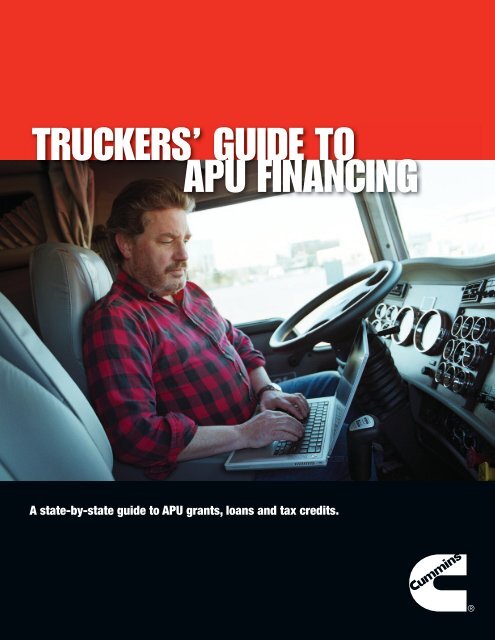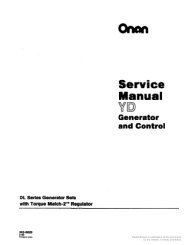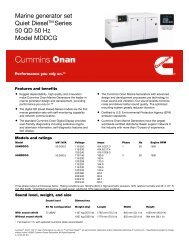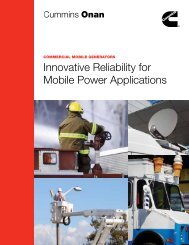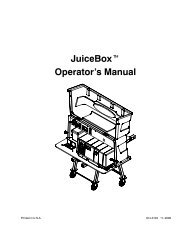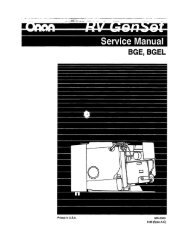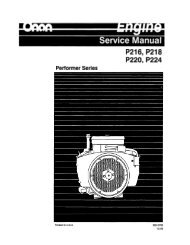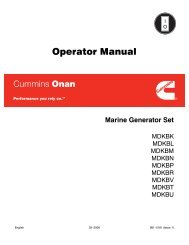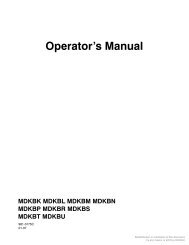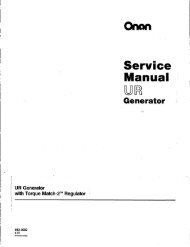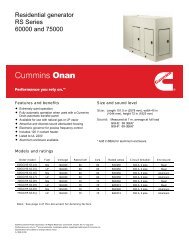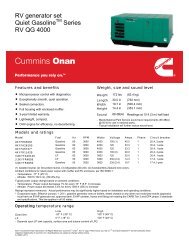TRUCKERS' GUIDE TO APU FINANCING - Cummins Onan
TRUCKERS' GUIDE TO APU FINANCING - Cummins Onan
TRUCKERS' GUIDE TO APU FINANCING - Cummins Onan
You also want an ePaper? Increase the reach of your titles
YUMPU automatically turns print PDFs into web optimized ePapers that Google loves.
TRUCKERS’ <strong>GUIDE</strong> <strong>TO</strong><br />
<strong>APU</strong> <strong>FINANCING</strong><br />
A state-by-state guide to <strong>APU</strong> grants, loans and tax credits.
2<br />
LOCATING <strong>APU</strong> FUNDING<br />
Whether you own one truck or a large corporate<br />
fl eet, this brochure is a valuable resource to<br />
locating and securing fi nancial assistance for your<br />
company’s auxiliary power units (<strong>APU</strong>s) and other<br />
idling technology.<br />
Various federal, state and non-profi t organizations<br />
provide funding that can be used for <strong>APU</strong>s and other<br />
technology designed to reduce emissions from longduration<br />
truck idling. Because of the importance of<br />
reducing truck idling, the amount of money available<br />
through grants alone totals in the millions.<br />
The vast majority of funds are available through<br />
state governments. Across the country, state<br />
agencies are increasingly aware of the benefi ts<br />
<strong>APU</strong>s provide, both in cost savings for truckers<br />
and lower noise and air pollution levels for the<br />
general public. As a result, a growing number<br />
of states are providing fi nancial assistance to<br />
trucking companies, large and small.<br />
The Days of Casual<br />
Truck Idling Are Over<br />
High-priced diesel fuel and strict state and local<br />
idling regulations are increasing the popularity<br />
and demand for <strong>APU</strong>s. Each year, more and more<br />
trucking companies are retrofi tting<br />
existing trucks and requesting<br />
<strong>APU</strong>s on their new trucks.<br />
Just like idling regulations, fi nancial assistance for<br />
<strong>APU</strong>s varies widely. Some states offer low-interest<br />
loans, while others provide grants or tax credits.<br />
Many programs are cooperative efforts of state<br />
and federal agencies. Some are more complicated<br />
than others. All require research. But the time is<br />
well spent, considering that some states have<br />
made millions of dollars available to help truckers<br />
fi nance anti-idling technology.<br />
IDLE TALK<br />
“Idle Talk,” also published<br />
by <strong>Cummins</strong>, provides a<br />
state-by-state overview of<br />
idling regulations.<br />
To download a copy, visit<br />
www.cumminscomfortguard.com.
USING THIS <strong>GUIDE</strong>BOOK<br />
This guide is divided into three sections:<br />
Part I<br />
An explanation of programs provided by<br />
agencies of the federal government, including<br />
the U.S. Environmental Protection Agency, the<br />
U.S. Department of Transportation and the U.S.<br />
Department of Energy.<br />
Part II<br />
A state-by-state compendium of programs<br />
offering low-interest loans, grants and tax credits<br />
specifi cally designed to help trucking companies<br />
purchase new or retrofi tted idling technology,<br />
including <strong>APU</strong>s.<br />
While more and more states are offering fi nance<br />
programs dedicated to <strong>APU</strong>s, the majority do not.<br />
So this section also includes the name, web site<br />
address and other information for each state’s<br />
department of business or economic development.<br />
If your state does not currently offer fi nancial<br />
assistance specifi cally for <strong>APU</strong>s, instead of<br />
www.cumminscomfortguard.com<br />
stopping your search for funding, be proactive and<br />
ask the appropriate state agency if <strong>APU</strong>s qualify<br />
for low-interest loans, grants or tax credits through<br />
existing economic development programs.<br />
Part III<br />
A list of collaboratives. These are regional networks<br />
that combine the efforts of local, state and federal<br />
governments, the private sector and environmental<br />
groups to fund emissions reductions of larger<br />
trucking fl eets.<br />
As you search the internet sites listed, you’ll fi nd<br />
that there is a lot of information available to help<br />
you learn about funding available, as well as how to<br />
qualify and apply for fi nancial assistance, whether<br />
you own one truck or hundreds. Good luck with your<br />
search for <strong>APU</strong> fi nancing. It will be well worth your<br />
time and effort.<br />
Calculate Your<br />
Potential Savings<br />
Idling control devices such as auxiliary<br />
power units save fuel and may have quick<br />
payback periods. To calculate your potential<br />
savings by using an <strong>APU</strong>, visit<br />
www.cumminscomfortguard.com/calc<br />
to quickly calculate your payback time and<br />
overall savings.<br />
3
4<br />
TRUCKERS’ <strong>GUIDE</strong> <strong>TO</strong> <strong>APU</strong> <strong>FINANCING</strong><br />
PART I – U.S. GOVERNMENT PROGRAMS<br />
SMARTWAY TRANSPORT<br />
SmartWay Transport is a voluntary partnership<br />
between various freight industry sectors and<br />
the Environmental Protection Agency (EPA)<br />
that establishes incentives for fuel effi ciency<br />
improvements and greenhouse gas emissions<br />
reductions. By 2012, this initiative aims to reduce<br />
between 33 and 66 million metric tons of carbon<br />
dioxide (CO2) emissions and up to 200,000 tons<br />
of nitrogen oxide (NOx) emissions per year. At the<br />
same time, the initiative will result in fuel savings<br />
of up to 150 million barrels of oil annually. There<br />
are three primary components of the program:<br />
creating partnerships, reducing all unnecessary<br />
engine idling and increasing the overall effi ciency<br />
of our transportation system.<br />
The SmartWay Transport program is working<br />
with states, banks and other organizations<br />
to develop innovative fi nancing options<br />
that help partners purchase devices that<br />
save fuel and reduce emissions.<br />
For more information on SmartWay Transport,<br />
visit its web site at: www.epa.gov/smartway.<br />
CLEAN CITIES PROGRAM<br />
Loans to Help Truckers Save Money, Reduce Emissions<br />
SmartWay Transport provides information on several<br />
lenders that offer loans to owner-operators and small<br />
trucking companies to help pay for technologies that will<br />
save fuel while reducing pollution. SmartWay Transport<br />
introduced these loans for the trucking industry in<br />
November 2006.<br />
A wide variety of technologies are available to help<br />
trucking companies save on fuel costs. However, many<br />
companies lack the required upfront capital. To help more<br />
companies start saving fuel and money while reducing the<br />
emissions produced by their trucks, SmartWay Transport<br />
has bundled a group of fuel-saving technologies into a<br />
package known as an “upgrade kit.”<br />
The Clean Cities Program is part of the Offi ce<br />
of Energy Effi ciency and Renewable Energy’s<br />
(EERE’s) Vehicle Technologies Program of the<br />
U.S. Department of Energy. It strives to advance<br />
the nation’s economic, environmental and<br />
energy security by supporting local decisions to<br />
adopt practices that contribute to the reduction<br />
of petroleum consumption. Clean Cities has a<br />
network of approximately 90 volunteer coalitions,<br />
which develop public-private partnerships to<br />
promote alternative fuels and advanced vehicles,<br />
fuel blends, fuel economy, hybrid vehicles and idle<br />
reduction – including the installation of <strong>APU</strong>s.<br />
The following page on EERE’s web site<br />
provides a summary of federal and state idle<br />
reduction programs, incentives and fi nancing<br />
alternatives available.<br />
www.eere.energy.gov/afdc/incentives_laws.html<br />
SmartWay Transport is using Small Business<br />
Administration (SBA)-approved lenders, as well as other<br />
fi nancial institutions, to help owner-operators and small<br />
trucking companies. These loans offer affordable monthly<br />
payment plans. The SBA-approved lenders offer affordable<br />
principal and interest monthly payments with no collateral<br />
required for loans ranging from $5,000 to $25,000. The<br />
SBA loans have fees associated with them as well as other<br />
requirements. Most truckers will save more money each<br />
month in lower fuel costs than the cost of loan repayment,<br />
thereby increasing their profi t.<br />
For more information on SmartWay, go to:<br />
www.epa.gov/smartway.
TRUCKERS’ <strong>GUIDE</strong> <strong>TO</strong> <strong>APU</strong> <strong>FINANCING</strong><br />
PART II: STATE-BY-STATE <strong>GUIDE</strong> <strong>TO</strong> <strong>APU</strong>-<strong>FINANCING</strong> OPPORTUNITIES<br />
Finance programs for idling technology are<br />
ongoing and vary widely from state to state.<br />
Some states offer one or more financing<br />
options, including small business loans, grants<br />
specifically designated for <strong>APU</strong>s and other idling<br />
technologies, and tax credits. The following<br />
information is for reference purposes only. Pay<br />
special attention to application procedures and<br />
deadlines, which also vary. If a program has<br />
The following states currently offer <strong>APU</strong> funding:<br />
State:<br />
ARKANSAS<br />
CALIFORNIA<br />
MAINE<br />
www.cumminscomfortguard.com<br />
Program Description:<br />
Arkansas SmartWay Program:<br />
The Arkansas Department of Environmental Quality has<br />
a small business loan program that provides low-interest<br />
loans to Arkansas small businesses to institute pollution<br />
control measures as required by state and federal law<br />
or to institute pollution prevention measures that reduce<br />
the amount of pollution produced by businesses. Idle<br />
reduction technologies and <strong>APU</strong>s are eligible for this loan.<br />
An eligible business must employ no more than 100<br />
individuals and demonstrate proof of profitability and the<br />
ability to repay the loan.<br />
Carl Moyer Program<br />
The California Air Resources Board and local air pollution<br />
control districts provide grants for the entire incremental<br />
costs of voluntarily reducing emissions from heavy-duty<br />
engines. Eligible projects include emission reduction retrofits,<br />
idle reduction retrofits, engine replacements (repower) and<br />
purchase of new, cleaner vehicles. Originally funded by<br />
the governor in 1995 with $25 million, this program now<br />
receives almost $155 million per year.<br />
Small Business Low Interest Loan Program<br />
The Maine Public Utilities Commission’s Maine State<br />
Energy Program assists small commercial, non-profit and<br />
manufacturing facilities with funding for approved energy<br />
conservation measures, such as <strong>APU</strong>s, by providing<br />
loans up to $35,000 at 3% interest (current fixed rate).<br />
already expired, be sure to inquire about future<br />
financing opportunities.<br />
As you will see, many states do not currently<br />
offer financial assistance specifically for <strong>APU</strong>s,<br />
but all states have business and economic<br />
development agencies that you can contact<br />
to discuss the growing need for <strong>APU</strong> financing<br />
and inquire about assistance through existing<br />
business lending programs.<br />
Contact:<br />
Business Assistance Manager:<br />
Darren Morrissey<br />
Phone: (501) 682-0824<br />
Toll-free: (888) 233-0326<br />
State of Arkansas,<br />
Arkansas Economic Development<br />
www.1800arkansas.com<br />
www.arb.ca.gov/msprog/moyer/moyer.htm<br />
To inquire about <strong>APU</strong> financing through<br />
existing business programs, contact:<br />
State of California, Business in California,<br />
www.ca.gov/state/portal/<br />
myca_homepage.jsp<br />
maine.gov/msep/incentives_loan_<br />
information.htm<br />
State of Maine, Department of<br />
Economic & Community Development,<br />
www.econdevmaine.com<br />
5
6<br />
TRUCKERS’ <strong>GUIDE</strong> <strong>TO</strong> <strong>APU</strong> <strong>FINANCING</strong><br />
State: Program Description: Contact:<br />
MINNESOTA<br />
NEW JERSEY<br />
NEW YORK<br />
NORTH<br />
CAROLINA<br />
The Minnesota Pollution Control Agency offers low-<br />
interest loans to small trucking fleets for purchase of idle<br />
reduction devices, single-wide tires, trailer aerodynamics<br />
and emissions control devices. It is partnered with the<br />
EPA SmartWay Transport program.<br />
Idle Reduction Technology Grant<br />
The New Jersey Trucker’s Challenge, established by the<br />
New Jersey Department of Environmental Protection,<br />
provides funding for the purchase or installation of idle<br />
reduction equipment used in New Jersey-based heavy-<br />
duty diesel trucks. Eligible equipment includes <strong>APU</strong>s and<br />
other emissions reductions technologies. The program<br />
pays for 50% of the cost of an <strong>APU</strong> up to a maximum of<br />
$4,500. The program is administered by the New Jersey<br />
Motor Truck Association.<br />
SmartWay also works with ACCION, a non-profit financial<br />
institution that provides loans up to $50,000 for New<br />
Jersey residents only.<br />
SmartWay also works with ACCION, a non-profit financial<br />
institution that provides loans up to $50,000 for New York<br />
residents only.<br />
Alternative Fuel and Hybrid Vehicle Grants<br />
Up to 80% of cost funding is available for idle reduction<br />
technologies.<br />
Grants from the Department of Environment and Natural<br />
Resources Division of Air Quality are available for the<br />
incremental cost of purchasing alternative fuel vehicles,<br />
vehicle conversions, implementing idle reduction<br />
programs and constructing or installing public alternative<br />
fuel fueling facilities.<br />
www.pca.state.mn.us<br />
To inquire about <strong>APU</strong> financing through<br />
existing business programs, contact:<br />
State of Minnesota, Department of<br />
Employment & Economic Development,<br />
www.deed.state.mn.us/bizdev/<br />
www.njmta.org<br />
Loan inquires: (866) 522-2466<br />
To inquire about <strong>APU</strong> financing through<br />
existing business programs, contact:<br />
State of New Jersey, Economic<br />
Growth & Tourism Commission,<br />
www.state.nj.us/commerce<br />
Loan inquires:<br />
E-mail: loans@accionnewyork.org<br />
Telephone: (212) 387-0494<br />
To inquire about <strong>APU</strong> financing through<br />
existing business programs, contact:<br />
State of New York,<br />
www.empire.state.ny.us<br />
For more information, contact<br />
Anne Tazewell, North Carolina Solar<br />
Center, NC State University<br />
E-mail: anne_tazewell@ncsu.edu<br />
www.eere.energy.gov/afdc/progs/view_<br />
ind_mtx.php/tech/BIOD/NC/0<br />
A package of available incentives is<br />
available for download at:<br />
www.ncair.org/motor/ms_grants
TRUCKERS’ <strong>GUIDE</strong> <strong>TO</strong> <strong>APU</strong> <strong>FINANCING</strong><br />
State: Program Description: Contact:<br />
OHIO<br />
OREGON<br />
PENNSYLVANIA<br />
www.cumminscomfortguard.com<br />
Heavy-duty Emission Reduction<br />
Grant and Loan Program<br />
Funds may be used for projects related to certified engine<br />
configurations, including rebuilt or remanufactured engine<br />
configuration, or installing verified technology, including<br />
pollution controls, retrofits and development of truck stop<br />
electrification and <strong>APU</strong>s.<br />
Diesel Emissions Reduction Grant Program<br />
The program is available for all public diesel engine fleets<br />
and private diesel engine fleets (with a public sponsor)<br />
that have at least 20% matching funds and that are<br />
committed to operating their updated equipment in Ohio<br />
non-attainment-and-maintenance counties at least 65%<br />
of the time.<br />
The “Everybody Wins” Program<br />
Initiated in 2004, this program was formed to offer low-<br />
cost leasing programs for idle reduction equipment on<br />
Oregon’s I-5 corridor. This program was expanded in 2006<br />
to include all known technologies that save fuel and reduce<br />
diesel emissions. Two financing options are offered: 1) Any<br />
fuel-saving technology that falls within the EPA’s SmartWay<br />
Transport Carrier Strategies and is approved by the<br />
program’s technical advisory team is eligible for financing;<br />
2) Oregon base-plated trucks may be qualified for the<br />
Everybody Wins lease program that provides below-<br />
market interest rates with 60-month repayment terms.<br />
Idle Reduction Incentives<br />
The Small Business Pollution Prevention Assistance<br />
Account Loan Program provides low-interest loans to<br />
small businesses undertaking projects in Pennsylvania<br />
that reduce pollution and energy use – including the<br />
purchase of <strong>APU</strong>s. Loans are available for funding up to<br />
75% of total project cost up to a maximum of $100,000.<br />
The loans have a 2% fixed interest rate and a maximum<br />
term of 10 years.<br />
Idle Reduction Grants<br />
For fleets of 50 trucks and fewer located in Pennsylvania<br />
or Delaware, financing is available to help owners purchase<br />
and install <strong>APU</strong>s that provide both heating and cooling.<br />
The maximum funding available is $3,000 per applicant.<br />
Jim Zuber, Advanced Energy Manager,<br />
Ohio Energy Office<br />
Phone: (614) 387-2731<br />
Fax: (614) 466-1864<br />
E-mail: jzuber@odod.state.oh.us<br />
Sam Spofforth,<br />
Clean Cities Coordinator / Executive<br />
Director, Clean Fuels Ohio<br />
Phone: (614) 292-5435<br />
Fax: (614) 688-4111<br />
E-mail: sam@cleanfuelsohio.org<br />
www.odod.state.oh.us/cdd/oee/<br />
transportation.htm<br />
www.cleanfuelsohio.org<br />
Sharon Banks, Cascade Sierra Solutions<br />
Phone: (541) 302-0900<br />
E-mail: sharon@cascadesierrasolutions.org<br />
www.cascadesierrasolutions.org<br />
To inquire about <strong>APU</strong> financing through<br />
existing business programs, contact:<br />
State of Oregon, Oregon Economic &<br />
Community Development Department,<br />
econ.oregon.gov<br />
Gene DelVecchio, Pennsylvania<br />
Department of Environmental Protection<br />
Phone: (717) 772-8951<br />
E-mail: gdelvecchi@state.pa.us<br />
www.marama.org/AntiIdle/index.html<br />
To inquire about <strong>APU</strong> financing through<br />
existing business programs, contact:<br />
State of Pennsylvania, Department of<br />
Community & Economic Development,<br />
www.newpa.com<br />
7
8<br />
TRUCKERS’ <strong>GUIDE</strong> <strong>TO</strong> <strong>APU</strong> <strong>FINANCING</strong><br />
State: Program Description: Contact:<br />
TEXAS<br />
VIRGINIA<br />
WISCONSIN<br />
Texas Emission Reduction Incentive Grants<br />
The Texas Commission on Environmental Quality has<br />
provided grants for incremental costs associated with<br />
reducing oxides of nitrogen in poor air quality areas.<br />
Eligible diesels include on-road heavy-duty vehicles,<br />
off-road equipment, marine vessels, locomotives<br />
and stationary equipment. Eligible activities include<br />
replacement, repower, emission reduction retrofit, idling<br />
reduction retrofit, idling reduction infrastructure, refueling<br />
infrastructure, alternative fuels and demonstrations<br />
of new technology.<br />
While applications are currently not being accepted under<br />
the ERIG program, you can register for the site’s E-mail<br />
Subscription Service to receive details on future funding<br />
opportunities as they become available.<br />
The Virginia Small Business Environmental<br />
Compliance Assistance Fund<br />
The Virginia Department of Environmental Quality is<br />
offering a low-interest revolving loan program to small<br />
businesses for pollution prevention purchases, including<br />
emission control devices and <strong>APU</strong>s.<br />
Wisconsin Diesel Truck Idling Grant Program<br />
The Wisconsin legislature created a grant program<br />
that will pay for up to 70% of truck idle reduction<br />
retrofits. There will be $1 million available per<br />
year for five years. This program began in July<br />
2006 and is supported by inspection fees on<br />
petroleum products coming into the state.<br />
www.tceq.state.tx.us/implementation/<br />
air/terp/erig.html<br />
To inquire about <strong>APU</strong> financing through<br />
existing business programs, contact:<br />
State of Texas, Office of the Governor,<br />
Economic Development,<br />
www.governor.state.tx.us/ecodevo<br />
Virginia Department of<br />
Business Assistance,<br />
Virginia Business Information Center<br />
Phone: (804) 371-0438<br />
Toll-free: (866) 248-8814<br />
E-mail: VBIC@dba.virginia.gov<br />
To inquire about <strong>APU</strong> financing through<br />
existing business programs, contact:<br />
Virginia Department of Business<br />
Assistance, www.dba.state.va.us<br />
www.legis.state.wi.us<br />
To inquire about <strong>APU</strong> financing through<br />
existing business programs, contact:<br />
State of Wisconsin,<br />
Wisconsin Department of Commerce,<br />
www.commerce.state.wi.us
TRUCKERS’ <strong>GUIDE</strong> <strong>TO</strong> <strong>APU</strong> <strong>FINANCING</strong><br />
PART III – COLLABORATIVES<br />
The Environmental Protection Agency has<br />
released nearly $50 million in grant funding to<br />
establish clean diesel projects aimed at reducing<br />
emissions from the nation’s existing fleet of diesel<br />
engines. The program will be administered by<br />
EPA’s National Clean Diesel Campaign (NCDC)<br />
and its network of seven collaboratives, made<br />
up of EPA regional offices and public and private<br />
sector partners.<br />
State, local, regional and tribal governments<br />
can apply for grants, as well as non-profits and<br />
West Coast Collaborative<br />
The West Coast Collaborative is an ambitious partnership<br />
among leaders from federal, state and local government, the<br />
private sector and environmental groups committed to reducing<br />
diesel emissions along the West Coast. Partners come from<br />
all over Western North America, including California, Oregon,<br />
Washington, Alaska, Arizona, Idaho, Nevada, Hawaii, Canada<br />
and Mexico. The collaborative is focused on creating, supporting<br />
and implementing diesel emissions reductions projects. For more<br />
information, visit the web site at www.westcoastcollaborative.org.<br />
Mid-Atlantic Diesel Collaborative<br />
The Mid-Atlantic Diesel Collaborative is a partnership among<br />
leaders from federal, state and local government, the private<br />
sector and environmental groups in Delaware, Maryland, Virginia,<br />
Pennsylvania, West Virginia and the District of Columbia. The<br />
collaborative is part of an overall national campaign to reduce<br />
diesel emissions. For more information, visit the web site at<br />
www.dieselmidatlantic.org.<br />
Blue Skyways Collaborative<br />
The Blue Skyways Collaborative was created to encourage<br />
voluntary air emissions reduction in North America’s heartland.<br />
Through partnerships with non-profit and environmental groups,<br />
private industries and international, federal, state and local<br />
governments, Blue Skyways strives to improve air quality.<br />
Today, Blue Skyways incorporates 10 states, Minnesota, Iowa,<br />
Nebraska, Missouri, Kansas, Arkansas, Oklahoma, Louisiana,<br />
Texas and New Mexico, and the area along the borders with<br />
Canada and Mexico. See the web site for more information,<br />
www.blueskyways.org.<br />
Northeast Diesel Collaborative<br />
The Northeast Diesel Collaborative (NEDC) combines the<br />
expertise of public and private partners in a coordinated<br />
regional initiative to significantly reduce diesel emissions and<br />
www.cumminscomfortguard.com<br />
institutions with transportation, educational<br />
services and air quality responsibilities.<br />
Grant recipients can use a variety of costeffective<br />
emission reduction strategies, such<br />
as EPA-verified retrofit and idle reduction<br />
technologies, EPA-certified engine upgrades,<br />
vehicle or equipment replacements, cleaner fuels<br />
and creation of innovative clean diesel financing<br />
programs. For more information about eligibility<br />
and deadlines, visit the web site,<br />
www.epa.gov/cleandiesel.<br />
improve public health in the eight Northeastern states. See the<br />
web site for information about programs and financing,<br />
www.northeastdiesel.org.<br />
Rocky Mountain Clean Diesel<br />
Collaborative<br />
The Rocky Mountain Clean Diesel Collaborative, the local arm of<br />
the National Clean Diesel Campaign, is a partnership of federal,<br />
state and local governments, non-profit organizations, the private<br />
sector and environmental groups in Colorado, Montana, North<br />
Dakota, South Dakota, Utah and Wyoming. The collaborative was<br />
established to reduce diesel emissions through voluntary efforts to<br />
improve air quality and protect human health by promoting grants,<br />
leveraging additional funding and offering technical assistance and<br />
education to interested parties. For more information, visit the web<br />
site, www.epa.gov/region8/air/rmcdc.html.<br />
Midwest Clean Diesel Initiative<br />
The Midwest Clean Diesel Initiative is a collaboration of federal,<br />
state and local agencies, along with communities, non-profit<br />
organizations and private companies working together to reduce<br />
emissions from diesel engines in the Midwest. The organization<br />
has set a goal to reduce emissions from 1 million diesel-powered<br />
engines by 2010 through operational changes, technological<br />
improvements and use of cleaner fuels. For more information,<br />
visit the web site, www.epa.gov/midwestcleandiesel.<br />
Southeast Diesel Collaborative<br />
The Southeast Diesel Collaborative is a voluntary, publicprivate<br />
partnership involving leaders from federal, state and<br />
local government, the private sector and other stakeholders in<br />
Alabama, Florida, Georgia, Kentucky, Mississippi, North Carolina,<br />
South Carolina and Tennessee. The collaborative is encouraging<br />
the use of technology to reduce diesel emissions from existing<br />
engines and equipment. For more information, visit the web site,<br />
www.southeastdiesel.org.<br />
9
10<br />
TRUCKERS’ <strong>GUIDE</strong> <strong>TO</strong> <strong>APU</strong> <strong>FINANCING</strong><br />
The following states currently do not offer <strong>APU</strong> funding:<br />
Visit the state web sites listed here to inquire about assistance through existing business lending programs.<br />
ALABAMA<br />
Department of Economic and Community Affairs<br />
www.adeca.alabama.gov<br />
ALASKA<br />
Alaska Commerce, Community and Economic Development<br />
www.commerce.state.ak.us<br />
ARIZONA<br />
Department of Commerce<br />
www.azcommerce.com<br />
COLORADO<br />
Office of Economic Development and International Trade<br />
www.state.co.us/oed/guide<br />
CONNECTICUT<br />
Department of Economic and Community Development<br />
www.ct.gov/ecd/site/default.asp<br />
DELAWARE*<br />
Delaware Economic Development Office<br />
www.state.de.us/dedo/information/information.shtml<br />
*Funding is available through Pennsylvania<br />
FLORIDA<br />
Enterprise Florida<br />
www.eflorida.com<br />
GEORGIA<br />
Department of Economic Development<br />
www.georgia.org/Business<br />
HAWAII<br />
Department of Business, Economic Development & Tourism<br />
www.hawaii.gov/dbedt<br />
IDAHO<br />
Department of Commerce and Labor<br />
www.idoc.state.id.us<br />
ILLINOIS<br />
Department of Commerce and Economic Opportunity<br />
www.commerce.state.il.us<br />
INDIANA<br />
Economic Development Corporation<br />
www.in.gov/iedc<br />
IOWA<br />
Department of Business and Economic Development<br />
www.iowa.gov/state/main/business.html<br />
KANSAS<br />
Department of Commerce<br />
www.kansascommerce.com<br />
KENTUCKY<br />
Cabinet for Economic Development<br />
www.thinkkentucky.com<br />
LOUISIANA<br />
Department of Economic Development<br />
www.lded.state.la.us<br />
MAINE<br />
Department of Economic and Community Development<br />
www.econdevmaine.com<br />
MARYLAND<br />
Department of Business and Economic Development<br />
www.choosemaryland.org<br />
MASSACHUSETTS<br />
Development Finance Agency<br />
www.massdevelopment.com<br />
MICHIGAN<br />
Economic Development Corporation<br />
www.michiganadvantage.org<br />
MISSISSIPPI<br />
Mississippi Development Authority<br />
www.mississippi.org<br />
MISSOURI<br />
Department of Economic Development<br />
www.ded.mo.gov<br />
MONTANA<br />
Department of Commerce<br />
www.businessresources.mt.gov<br />
NEBRASKA<br />
Department of Economic Development<br />
http://assist.neded.org/
TRUCKERS’ <strong>GUIDE</strong> <strong>TO</strong> <strong>APU</strong> <strong>FINANCING</strong><br />
NEVADA<br />
Nevada Commision on Economic Development<br />
www.expand2nevada.com<br />
NEW HAMPSHIRE<br />
Division of Economic Development<br />
www.nheconomy.com<br />
NEW MEXICO<br />
Department of Economic Development<br />
www.edd.state.nm.us<br />
NORTH DAKOTA<br />
Department of Commerce<br />
www.growingnd.com<br />
OKLAHOMA<br />
Department of Commerce<br />
www.okcommerce.gov<br />
RHODE ISLAND<br />
Economic Development Corporation<br />
www.riedc.com/business-services/financing<br />
SOUTH CAROLINA<br />
Department of Commerce<br />
www.sccommerce.com<br />
SOUTH DAKOTA<br />
Governor’s Office of Economic Development<br />
www.sdreadytowork.com<br />
TENNESSEE<br />
Department of Economic & Community Development<br />
www.state.tn.us/ecd<br />
UTAH<br />
Governor’s Office of Economic Development<br />
www.dced.utah.gov<br />
VERMONT<br />
Vermont Department of Economic Development<br />
www.thinkvermont.com<br />
WASHING<strong>TO</strong>N, D.C.<br />
Small and Local Business Development<br />
www.dc.gov<br />
WEST VIRGINIA<br />
Development Office<br />
www.wvdo.org/business/index.html<br />
www.cumminscomfortguard.com<br />
WYOMING<br />
Wyoming Business Council<br />
www.wyomingbusiness.org<br />
CANADA<br />
Canada has two government-sponsored incentive programs<br />
aimed at reducing diesel truck idling. At the province level<br />
and city level, there are numerous programs to encourage the<br />
installation of idle reduction technology that may not provide<br />
specific financial incentives. The following national programs do<br />
provide financial incentives:<br />
Freight Technology Incentive Program<br />
As part of the Canadian government’s Transport Canada<br />
ecoFREIGHT program, cost-shared funding is provided to<br />
companies and non-profit organizations in freight transportation<br />
to help them to purchase and install proven emissions-reducing<br />
technologies. Eligible projects under the program include<br />
diesel anti-idling equipment. Projects can be funded to cover a<br />
maximum of 50% of eligible project costs totaling no more than<br />
$500,000 over two years.<br />
www.tc.gc.ca/programs/environment/ecofreight/<br />
programincentive-eng.htm<br />
FleetSmart<br />
The ecoENERGY for Fleets program is offered by Natural<br />
Resources Canada and promotes energy-efficient practices<br />
among trucking fleets in order to reduce fuel consumption and<br />
emissions. FleetSmart is a component of this program, offering<br />
free practical advice on how energy-efficient vehicles and<br />
business practices can reduce fleet operating costs, improve<br />
productivity and increase competitiveness. Beginning in 2003,<br />
FleetSmart began offering a rebate of 19% toward the purchase<br />
of <strong>APU</strong>s and other idling reduction technologies, up to a<br />
maximum of $1,400. For information about current availability of<br />
incentives, visit the web site.<br />
www.fleetsmart.gc.ca<br />
DISCLAIMER: Portions of this brochure were directly taken from<br />
the EPA’s and other federal and state government, collaborative<br />
and non-profit web sites. Some programs may have been<br />
changed or may have expired. For updated information, contact<br />
the agency or collaborative directly or through its web site.<br />
11
<strong>Cummins</strong> Inc. is a corporation of complementary business units that<br />
design, manufacture, distribute and service engines and related<br />
technologies, including fuel systems, controls, air handling, fi ltration,<br />
emission solutions and electrical power generation systems. <strong>Cummins</strong><br />
serves customers in more than 160 countries through its network of 550<br />
company-owned and independent distributor facilities and more than<br />
5,000 dealer locations. The <strong>Cummins</strong> ComfortGuard <strong>APU</strong> system is<br />
manufactured with the expertise of the company’s <strong>Onan</strong> brand.<br />
For more information about the new<br />
ComfortGuard <strong>APU</strong>, contact:<br />
Craig Gelderman<br />
<strong>Cummins</strong> Inc.<br />
1400 73rd Ave. NE, Minneapolis, MN 55432<br />
Phone: 763-574-5188<br />
Fax: 763-574-8060<br />
or visit www.cumminscomfortguard.com<br />
© 2008 <strong>Cummins</strong> Inc. F-1720


